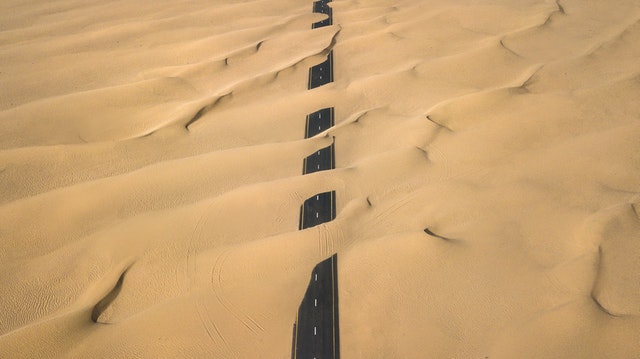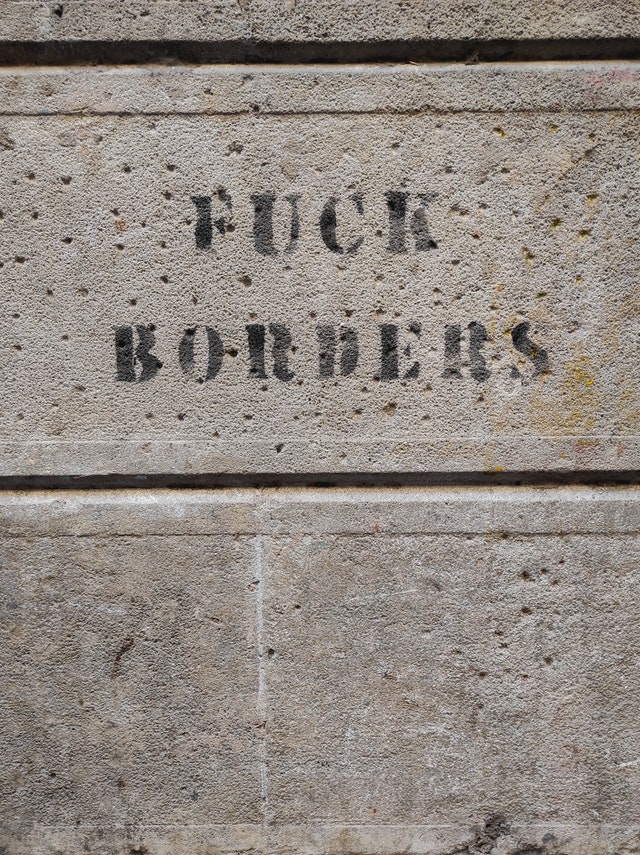We recently highlighted the danger Ukrainian refugees face from human traffickers in European countries. But the issue of seeking safe refuge in a time of crisis is a complex and global one. Experience from other parts of the world show what can happen when the first wave of aid for the refugees has subsided and Europe goes back to business as usual.
Where rich and poor areas are in close proximity, where public safety is takes a back seat, opportunities for all kinds of exploitation arise, especially human trafficking. Whether in Libya, in camps for refugees from Central Africa who have no way of getting into Fortress Europe, or on the border between Mexico and the United States of America: the strict, inhumane practice of turning away refugees means that these people are subjected the lawless brutality of the criminal organisations that establish themselves in the shadows of these borders.
Transit countries, which are themselves rather poor, are struggling with an onslaught of destitute people. Their social systems are not prepared for this; if aid payments arrive at all from rich countries or from the UN, they are not primarily spent on the unwanted people, but on their own population, or seep away into the pockets of corrupt officials. Rich countries, which primarily fight migration and only see help as a secondary priority, cynically promote structures that serve to make fleeing more dangerous and less attractive. In Libya, a country ravaged by civil war, the coast guard has received millions of Euros in exchange for not letting boats with refugees cross to Europe.
LIBYA – THE SLAVE MARKETS OF THE 21ST CENTURY
Following the Arab Spring and the overthrowing of the dictator Muammar al-Gaddafi in 2011, Libya was plagued by a civil war that ended in a ceasefire in 2020. Elections planned for the end of 2021 have been postponed by half a year for the time being, and it is unclear who will lead the government or whether the country can be governed at all.

Muslim society in North Africa has a long tradition of slave ownership. This practice continued into the 19th century and only ended under very strong pressure from European countries. It is no wonder that slavery and forms of it such as human trafficking are thriving again in the legal vacuum. The racism that is widespread among “white” Arabs in North African countries towards people from Central Africa is another reason why refugees who came to Libya from the south are acutely endangered. The International Organization for Migration has documented regular slave markets, where people are sold for ransom, but also for forced labor and sexual slavery.
People apprehended by the authorities are sent to state or semi-state “prisons” (because of the illegality of border crossing it is easy to find a “legal basis” for doing so). Since the operation of prisons costs money, “privately” operated “prisons” have also been established, which serve to optimise their operators’ profits. (The media in Europe often gloss over these by speaking of “refugee camps”.) Of course, in a climate of violence, extortion, forced labour and labor exploitation, human trafficking and forced prostitution also take place here. Where human rights are worth nothing, people quickly become commodities.
Former US President Barack Obama has cited the biggest mistake of his presidency as the Western powers that ignited the conflict, leaving Libya alone in the civil war. This error continues to have an impact today and shows that it is not enough to depose a dictator but then to leave society alone in a civil war.
MEXICO – WHERE SEXUAL VIOLENCE IS THE NORM
In itself, the large North American country is considered a democratic state with a certain level of prosperity and functioning structures. The proximity to the USA, however, has favoured some difficult developments: The Mexican market has been flooded with firearms from the US southern states due to the practically uncontrolled sale of firearms, and the huge demand for drugs has given rise to powerful cartels. These cartels exercise actual control in many areas, with the connivance or support of a threatened or corrupted police force. So it’s no wonder that people who want to flee from precarious conditions in South and Central America to the USA are in acute danger in the huge country of Mexico.
Mexico seals off its southern border to keep migrants from Central America out as much as possible. This is the first opportunity for criminals to come into contact with people who are fleeing. Refugees are in a difficult position because if the authorities apprehend them, they will be deported back to their home countries. Therefore a risk exists of having paid a fortune for a dangerous journey without improving one’s own situation. As a result, those affected avoid contact with the police and are therefore often at the mercy of human traffickers.
There is a chance for persecuted people to get asylum in the USA. Since an executive order issued by Donald Trump that the Biden administration has not yet withdrawn, the US has been sending asylum seekers back to Mexico while their process of seeking asylum is ongoing. Instead of taking responsibility for them, the US authorities endanger these people without legal status by sending them to Mexico.
The United States Department of State describes the situation in Mexico in detail in a report – but does not address the problem of the non-acceptance of asylum seekers. The report points out that human traffickers in Mexico are not choosy when it comes to choosing their victims: In addition to refugees from other countries, members of indigenous tribes and street children are trafficked for forced prostitution in Mexico and the USA.

Those who have no chance of asylum must cross the heavily guarded border between Mexico and the United States illegally. Since this is very difficult without the services of criminals, sexual violence against women and girls seems to be the sad norm in this area. Mexican and US officials are just as implicated in rapes as traffickers and cartel members. There is no effective protection against these acts of violence.
LGBTQI PEOPLE EVERYWHERE
People with a sexual orientation or gender identity that deviates from the social norm are threatened by additional dangers in many situations, and not just when trying to seek refuge. This is indicated, for example, in the United Nations Office on Drugs and Crime report on human trafficking (page 38). They are often rejected by their families and thus end up in situations in which they are more easily exploited. According to the studies cited, the proportion of LGBTQI people among homeless young people is often higher than in the overall population.
Those attempting to flee their country because of this persecution face additional problems along the way that people whose identities are considered normal do not have. For example, they have to keep their reasons for fleeing secret on the way so as not to be discriminated against, betrayed or killed. At the same time, because of their previous discrimination, they begin from a much more difficult starting point, with fewer resources, and this makes them more vulnerable to exploitation – instead of money, they have to ‘pay’ them with other things. For these reasons such people are more often victims of human trafficking than others, and democratic countries should do everything in their power to protect them.
